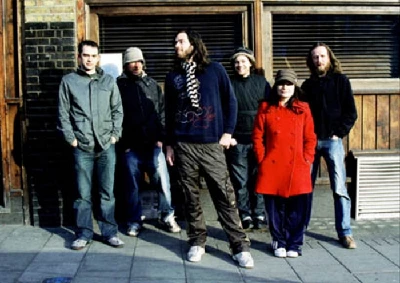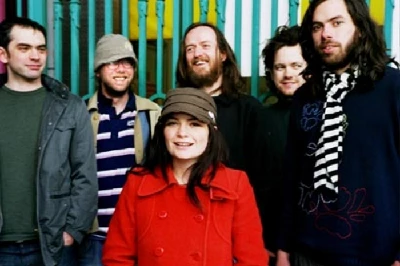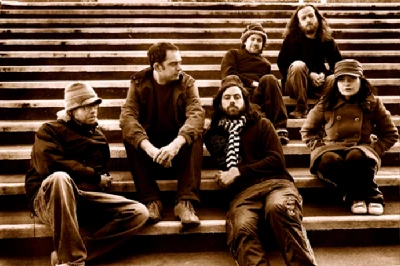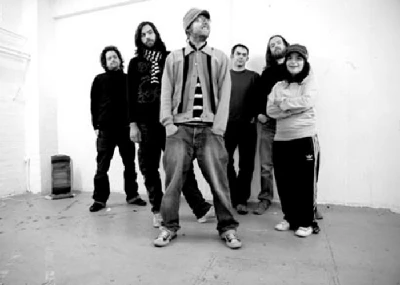Tungg
-
Interview
published: 22 /
11 /
2006
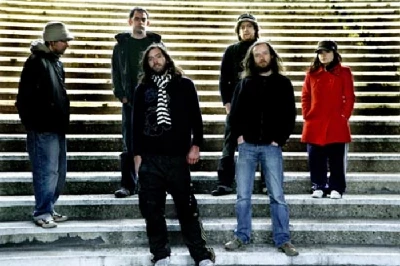
Tunng's song-driven folk electronica albums has won them ectastic acclaim, especially for their second album 'Comments of the Inner Chrous'. Anthony Dhanendran catches up with singer/lyricist Sam Genders and producer Mike Lindsey in London on their first ever tour.
Article
Tunng have produced two of the most beguiling song-driven folk electronica albums of the last few years in 2005's 'Mother’s Daughter and Other Songs' and 2006’s 'Comments of the Inner Chorus'. We caught up with singer/lyricist Sam Genders and producer/guitarist Mike Lindsey before they went on stage for their final London date of the year at the Scala in King’s Cross.
PB : So you're about seven nights through the tour. How's it going?
ML : It's been amazing, really. Some of the nights have been sold out and others have been really rammed. It's our first-ever tour so it's still quite shocking that there are people there that have come to see us. We not used to that.
PB : Is playing live important to you? Some bands don’t take to it.
ML : Yeah, it is. We don’t hate it. We’re all really good friends and we’ve become really close over the past couple of years, as people. And I can’t think of anything more exciting than traveling around different countries and cities with people you’re friends with and playing music that you enjoy.
SG : It feels like when I was in bands when I was a kid. You go and play in your local pub and it’s rammed full of your mates. It’s a bit like that, except the venues are bigger and the audiences are bigger. But it’s weird to get that thing where you go somewhere and people know the songs, and they know the lyrics. Because obviously that doesn’t happen in real life. So it’s good fun.
PB : How hard is it to translate what’s on the record to the way you play live?
ML : Initially it was really hard, because Sam and I spent a long time working on the first record and there was nobody else involved. So we didn’t really want to do it with just a laptop and a guitar. The music felt like it needed people to play it properly, so it’s taken some time but I think we’ve got there now. Everyone knows their role and we’ve got three guitars and percussion, and live samples, and [vocalist] Becky.
PB : Tunng’s first album, 'Mother’s Daughter and Other Songs' was recorded by just the two of you. Were any of the band involved in the recently released album 'Comments of the Inner Chorus'?
ML: It’s a combination: us two were the only writers, but everybody’s on the record. There are a lot of voices on there. But for the third record, which we haven’t even written yet, we’re thinking of ideas. That’s going to be a collaboration with everybody on a more creative level.
PB : Is that going to mean a change in the way you sound?
ML : Possibly.
SG : There probably will be some kind of change.
ML: But in a positive way, you know? I mean, I see 'Comments of the Inner Chorus' and 'Mother’s Daughter' as almost like one record. It’s got a sound. And I don’t want to make the same record again. I think we need influence from other people to take it to another level.
SG : It’s going to become stale if you just keep doing the same thing.
ML : It becomes stale to us. But we know what we like and what the Tunng vibe is, and I don’t think we’re going to lose that. We’ll wait and see, we haven’t done it yet.
PB : Are you quite perfectionist when recording? Both albums sound like they’ve been crafted and laboured over for a long time.
ML : I’m not a perfectionist. Even stuff like getting a guitar part down, half the time it’s down in one take and a bit of a tweak, and I’ll chop up beats and work things out. I kind of believe in, if it’s sounding right after a few sort of mixes and things, then just finish it and move on. Otherwise you can just labour and labour over it. I mean, it is crafted, but it’s still pretty raw, I think.
PB : The way you’re putting a record together on computers and samplers, it must be quite tempting to keep working on it. You must have a lot of willpower to draw a line at the right point.
ML : But when it sounds good, it sounds good.
SG : Mike’s really brilliant when he’s working on the desk, with the computers and samplers. And without sounding too cheesy, he plays it a little bit like an instrument. It sort of evolves quite quickly, and there isn’t a massive amount of going back over stuff. He knows how to use the equipment to get things that sound interesting early on in the process.
PB : Is that’s the product of having worked in the music industry and in recording studios?
ML : Well, yeah, I work in a studio and I’ve been composing music for films and TV. It’s just great having that environment where everything’s to hand. You just slap things on and find things that make it work, like a jigsaw puzzle. Sam can come up with amazing poetry, fantasy, dark wonky nonsense, in the space of, like, 25 minutes, while you’ve been having a piss or something. Together we work really well and quite quickly, I think.
PB : How did you end up covering Bloc Party’s 'Pioneers' ?
ML: Actually, we got asked to do it, which was great, it was an honour to be asked, but it was never used. It was going to be a B-side of their single. Eventually it started to become part of our repertoire. Wichita [Bloc Party’s label] were trying to put out our record in America, so I think they were trying to promote us in that way, but it fell through.
PB : Do you find it easier to play smaller venues than larger ones? How have you found doing festivals?
SG : Festivals are very different in the way that they’re organized technically. You get there, plug in, and play, more or less. Normally, the way it works for us on stage is that we kind of need to hear what we’re all doing, and we bounce off each other a lot. Sometimes you turn up and it can be really… we had a couple of disasters [Laughs]. I don’t think they were disasters for the audience, but we couldn’t hear anything. But then the other side of it is the spontaneity of festivals, the way you get the big crowds, and there’s a really big party atmosphere.
ML : At the Green Man festival there were 4,000 people watching us, and it was a really good time, and good spirits.
SG : There were people there listening to us who, because they’re at the Green Man festival, are more likely to be interested in what we’re doing, but they might not necessarily have heard of us. So playing to people who haven’t heard of you, that’s really nice.
ML : At the same time on this tour we’re playing different kinds of venues, like in Malaga it was this sort-of theatre that was like a mini Royal Albert Hall. Seated floor, and boxes round the side, and it was all very hushed and polite. And I find that quite scary. You end up sort of saying: [hushed voice] “Hi”, “Thank You”, and “this next one is”…
On the flip side, in Manchester we played the Night and Day café, which was 300 people, sold out, rammed up the front, smoking, drinking and going “Oi oi!” and all that. In a way I prefer that, because we can feed off that too, it’s about give and take.
PB : What’s coming up next for Tunng?
ML : Immediately the future is a schedule of buses, hotels and seeing Europe. It’s amazingly exciting, playing to some new crowds that may or may not have seen us or heard of us.
PB : So you’re not tired of touring yet, then?
ML : We haven’t done it enough yet.
SG : It’s all fresh and new and… exhausting.
PB : Thank you.
Picture Gallery:-
